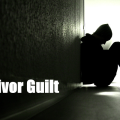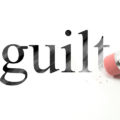
After losing someone to suicide you can find yourself combing through every moment of the past, questioning whether you missed the signs. Every memory holds new meaning. What if I would have paid more attention that day? What if I would have questioned their thinking, or pointed out something that didn’t seem right? Would they still be here today? Questions like this often contribute to the overwhelming presence of guilt we feel in the aftermath of suicide. Problem with this thinking is, it leads to unrealistic expectations of self. We can’t go back. We can’t change the past. So, why do we hold on to these experiences, and why do we struggle to relieve ourselves from the weight of guilt?
I wanted to use this post to talk about my own experience with guilt, and how I was able to release the guilt I felt after losing my dad to suicide. It is a part of my story that isn’t always easy to talk about. While it is the part of the story that I struggled the most to let go of, it is also the part of my story that brought the most self reflection. When people ask me, “Did you see the signs?” I struggle with my response. Yes, I saw the signs. They were right in front of me, and I wasn’t able to prevent my dad’s suicide. The night before Thanksgiving 2011, my sister called to tell me that she was worried about our dad. “He just seems off, and I am scared he is going to do something to himself.” So, I called him. I remember sitting in the car for over an hour talking to him about how he was feeling. He showed signs then, but I just didn’t think they were severe. I thought they were fleeting thoughts, ones that so many people have but don’t act on. Fast forward to Christmas day, the last day I saw my dad, and there you will find every sign that you need. He told me he was feeing suicidal. He brought my late grandmother’s large standing jewelry box for my sister and me to go through. He was detached, uninterested in any gift he received. He wasn’t himself. I remember when he left that day, the tears in his eyes as he hugged me tightly, and waved good bye until we both could no longer see each other. An act that I haven’t done since childhood. I turned to my husband and sister and said, “I don’t think I am going to see him again” and broke down. My sister and I planned an intervention of sorts. We would bring him to my sister’s house, find him a new therapist, get him the help he needed. I would stay in Colorado longer than planned and do what we needed to do for my dad. The following day we talked to my dad. He was back. The lively, happy, fun loving man was back. He told us, he was out shopping and felt “so much better.” The signs disappeared. The next day, I got on a plane back to Chicago. Four hours after getting home I received a call from my hysterical sister telling me that my dad took his life. In an instant my whole life changed.
I think we often set unrealistic expectations for ourselves. We forget about one important element within our tragedy; free will. We can’t take away, or alter someone else’s free will. I think this is an important reminder as we struggle with guilt after a suicide. I struggled for a long time with this concept. I saw the signs, I could have done something, I could have changed the ending to this story. Those are just a few of the things I told myself after my dad’s death. As I write this post I find myself questioning it all over again. It is hard not to. However, it just isn’t productive. Could have I done more? Maybe. Would it have changed the outcome? Maybe. That’s just it. Maybe. We can’t go back, we can’t change what has already occurred. That is what I had to come to terms with, and accept. Not easy, but an essential part of my own journey. I had to make the choice. I can go on living in this world where I hate myself for not doing more. Or, I can accept what is. The reality of the situation is that my dad is gone, and there is nothing I can do to change that. The only thing I can change and have changed is my own way of thinking and my own way of living. I made the choice to forgive myself, and decided that I would live a life that my dad would be proud of. A life that he potentially was never able to have.
A good friend always says, “You have a fire of regret and a fire of hope for the future. You choose which one to feed.”




Jessica,
Thank you so much for sharing this. I too saw the signs prior to my dad’s suicide last July. It wasn’t a matter of not knowing what the signs were- I did.
For me, it was not wanting to believe my dad would actually die by suicide. I attributed the signs as logical reactions to grief- after all his wife died just four months before. Didn’t it make sense he would be withdrawn and depressed?
I agree that the best we can do now is to quiet those self-deprecating voices by forgiving ourselves for being human- by taking this tragedy and living better because if it and, in that process, helping others affected by suicide along the way.
Thanks for all you do to that end.
I think that is so true for many. You see the signs but never believe they would actually go through with it. Suicide just doesn’t seem real.
Happy that this site and our posts are helpful to you and everyone else that has been touched by suicide.
This is a wonderful post and I thank you so much for writing it. My husband struggled with depression and anxiety most of his life and what you describe as your father’s last days were exactly my husband’s as well. Sad, suicidal, depressed, on medication, in counseling. Last day of his life he told me “he felt so much better”, yet I found him dead in the morning. The feelings of guilt are all consuming at first but you’re right. There’s no control over what was done, we survivors can only live the life that we KNOW our loved ones would have wanted us to live. I focus on the pain that he endured for decades. How many of us can endure that much chronic pain? So, let’s give credit for the strength they had to survive as long as they did. Thank you again so much for sharing and for this beautiful blog!
I couldn’t agree more. We do have to give them credit for living in pain for so many years. I can’t imagine how exhausting life was.
We are so happy that you found our blog and that it offers you comfort.
Thank you for this post. Guilt and going back over the what ifs is the hardest thing I struggle with. My much loved partner became quite verbally abusive and pushed me away with hurtful comments, and his actions became quite irrational in the few weeks before his death. I felt so hurt by what he said and did and now I feel so guilty that I didn’t realise it was major panic attacks and fear rather than a genuine Attack in me. He had made a previous suicide attempt yet it didn’t even enter my head he might be thinking of it. He was talking to his counsellor, his psychiatrist, and trying to get admitted to a psych ward, yet none of those professionals could prevent his death either. It is a small comfort to know that I am not the only one who was unable to stop what he did. It is so hard to stop going over and over it. I hope you will do more posts on dealing with guilt and looking to the future as I find them helpful.
It is difficult to just accept the reality of what occurred. It is like I said in the article….we can’t take away someone’s free will. We can do everything possible to try and keep them safe, but at the end of the day we can’t control them. It certainly isn’t an easy concept to swallow!
Thank you for sharing this. It is often those “Yes” responses that hurt the most when people ask “Did you see signs?” We feel judged by others, but only because we are judging ourselves. It is hard to release that guilt or to question what life would be like now. We are not responsible for someone else’s actions no matter how many barriers we put up for prevention. Thank you <3
Absolutely Katherine. We judge ourselves far more than anyone else. We can’t control what another person does. We can try to lead them down the right path but at the end of the day, it is their decision which path to take.
THE POEM BELOW HELPED ME A GREAT DEAL WHEN I LOST MY FATHER TO SUICIDE BACK IN 2008
MAY IT SERVE AS A GUIDE TO OTHERS AS IT HAS TO ME.
When I die
Give what’s left of me away
To children
And old men that wait to die.
And if you need to cry,
Cry for your brother
Walking the street beside you.
And when you need me,
Put your arms
Around anyone
And give them
What you need to give to me.
I want to leave you something,
Something better
Than words
Or sounds.
Look for me
In the people I’ve known
Or loved,
And if you cannot give me away,
At least let me live on your eyes
And not on your mind.
You can love me most
By letting
Hands touch hands,
By letting
Bodies touch bodies,
And by letting go
Of children
That need to be free.
Love doesn’t die,
People do.
So, when all that’s left of me
Is love,
Give me away.
Jessica,
I cannot thank you enough for being open and sharing your personal journey. That cannot be easy and you have shared it several times. I admire your courage!
Your words spoke to me! I have never considered that we cannot change a person’s free will! That gives me a feeling of freedom….a feeling that we are not responsible for our loved one’s death. They knew how much we loved them…that we would never want them to go as they did. Sadly, we also could not change their will.
Thanks for encouraging us to choose to live on as they would want us to and for dedicating so much of your life to serve others touched by this loss. You, Becky and your site are an inspiration to me!
I am so happy that this spoke to you! I don’t think many people connect free will with suicide which leads to the guilt we experience. We forget that we can’t take away someone else’s free will. Don’t sell yourself short…you are inspiring others as well:) And I love watching it!
Wow…
I want to thank you. Thank you for sharing. I too lost my daddy to suicide just shy of a year ago and a year and one month after losing my nanny to suicide.
With my nanny, I was blindsided, I never seen the signs. Still living with the quilt of not seeing the signs from my Nannie, I seen signs from my daddy. I also thought, my daddy wouldn’t do that. He started giving his things away even his tools that he used on an average work day, my eyes where open but we’re blindfolded. I think the biggest part of me didn’t want to believe it.